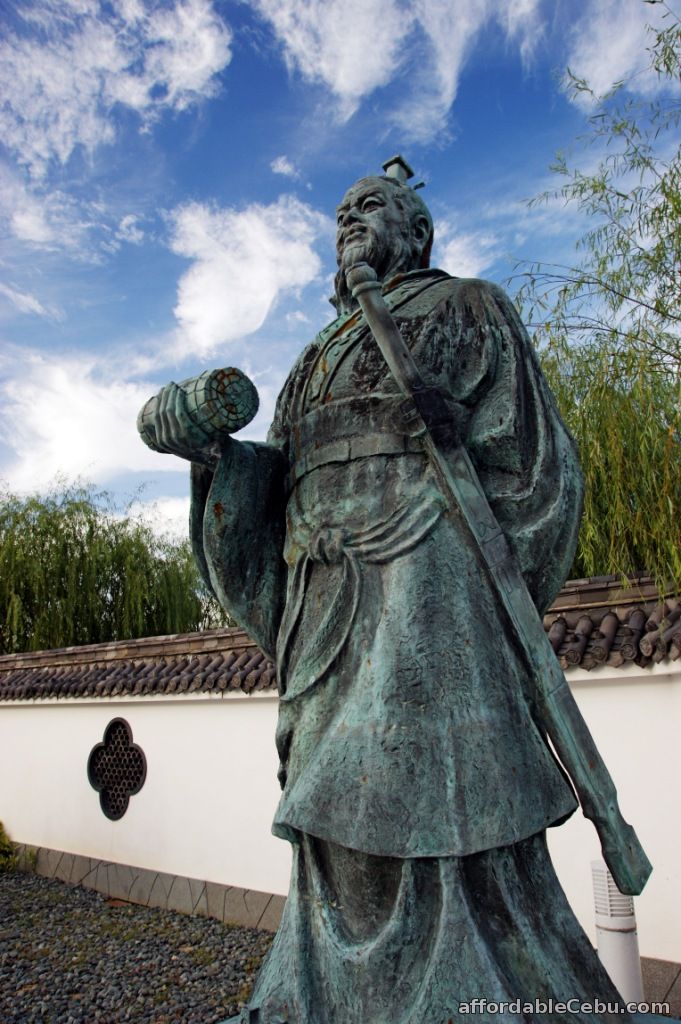
Statue of Sun Tzu in Yurihama, Tottori, Japan
He wrote "The Art of War" in around 500 B.C. It was written on vertical bamboo strips, each the length of a chopstick.

"The Art of War" is read by military generals, CEOs and professional sports coaches.
Those top leaders in different fields who read the book? They're too many to mention. They attributed part of their success to the book.
Sun Tzu's secrets are kept hidden for more than 1000 years and made available only to emperors and authorized scholars.
Its importance cannot be undermined.
Today, the "The Art of War" principles can be found on over hundreds of books. They were applied in the armed forces, sports, politics and even in business.
Understand the lessons and you will win. Ignore them and you are doomed to fail.
"The Art of War" consists 13 chapters with many insights but there are 3 key principles that stand out and unifies Sun Tzu's teachings.
What are they?
Sun Tzu said, (1) "Avoid what is strong. Attack what is weak."
Two neighboring regions of Ancient China, Wu and Chu were on the state of war. Sun Tzu is from Wu. He trained his army to defend Wu against the army of Chu.Sun Tzu's army were only about 33,000 men. Chu's army were over 300,000. Even though Sun Tzu's army were outnumbered by Chu 10 to 1 (10:1), he still won the battle.Sun Tzu's strategy? He chose soft targets like remote outposts and border crossings. In other words, he attacked what is weak and avoid what is strong.In business, for example, you want to start a network marketing (MLM) business. You've heard that one of your competitors is selling new products, like for example ebooks, or unique and more enhanced food supplements with a new market and new demand.You don't necessarily need to do the same thing. It's their strength. If you do the same thing, you will both share the market and profits will be divided and distributed to both of you. Chances are you get a smaller share of the market since your competitor is the first one who introduced those products/services and they are the first one who penetrated the market.Know where your competitors are weak at. If you introduce super effective and one of a kind products or services that cannot be found somewhere else, you can own a bigger share of the market. If people know about those products/services they never heard of, it will drive them crazy to buy, avail or use them.Microsoft, on its first few years, focused on developing the windows operating system and ignore the potential of search engine. Later, they regret that Google, competitor of Microsoft's MSN search engine, had developed the most innovative search engine that delivers fast, relevant and useful results compared to MSN search engine. Google knows where they stand and what's weak with other companies in the same industry. The search engine is a billion-dollar industry. That's why Google keeps on developing on where they are strong - the search engine.What is the other key principle of Sun Tzu that shoud be highly valued?
Sun Tzu said, (2) "Know your enemy and know yourself and in 100 battles you will never be in peril".
In business, you must know the latest update of your competitor, their strengths and their weaknesses. You must also know the current status of your business, your strengths and your weaknesses.If you have a restaurant business, you should consistently observe your competitor. Maybe he is adding a unique and special menu every month. He is beautifying the restaurant. He acquires some equipment for better service. Or maybe he offers free value-added products such as free soup, free extra rice or even unlimited rice. You should be aware of these things and keep your restaurant better than your competitor in most aspects of a restaurant business. If you cannot cope up with the competition, many of your customers will not hesitate to go to your competitor's restaurant. The same applies to other businesses.If you are engaged in a network marketing (MLM) business, you can be an amazing speaker in a business opportunity meeting (BOM) if you know so much about the strengths and weaknesses of your MLM company and your competitor's MLM company. You can now challenge your audience that your MLM company is better than his MLM company. And you can discourage the audience to join other MLM companies because you know what's the best of your MLM company. You know what's worst of your competitors' MLM company. Thus, you convince them to join you.Knowing your enemy (competitor) is as important as knowing yourself. One way of acquiring information about your competitor is hiring spies, agents or intelligence units. That is if the company can afford to. Due to the evolution of the internet, you can access any information on the web at a click of a mouse. Just search in Google what you want to know about your competitor and their latest updates. Assess your business and act on something better and unique.There are many other aspects of business you should consistently monitor and develop. Examples are corporate governance or leadership, financial analysis, business operations, property administration, team building, salesmanship, product pricing, customer service, and among others.What else is Sun Tzu's key principle in which many top leaders attributed their success?
Sun Tzu said, (3) "To win 100 battles is not the height of skill, To subdue the enemy without fighting is".
I think the greatest battle of mankind is not by force but by brain. War is like playing chess. You can win if you plan, maneuver and trick your competitor by seemingly deceptive moves.To engage in war is very costly. You can win the war with minimal or no cost if you prepare, manipulate and deceive your competitor.In business, for instance, banks in the old days when automated teller machines (ATM's) were newly introduced. Bank A sees Bank B hiring more tellers/staff to serve more clients for faster banking transaction. Thus Bank B attracts more clients and get a bigger share of the market. Bank A is worried. Number of clients is decreasing. Bank A thinks to do the same with Bank B - to hire more tellers. But Bank A considers more options. Bank A plans, researches and see ATM's sold in the foreign country. Bank A thinks that this could benefit and profit the bank in the long-term. Bank A decides to buy ATM's. Who do you think will profit the most and get the bigger share of the market? Bank A, of course.That's why almost all banks nowadays have ATM's everywhere.Success in business competition is mainly a matter of business intellect and not by number of resources.
Strategic thinking, tactics or indirect methods to deal with competitor are essential ideas that govern "The Art of War".
While it provides us insights of the wars of the past, it could prepare us for the wars of the future - even in business war.
Can you share any successful business strategy with us? Do you have any secret tactics that you're using in your business?